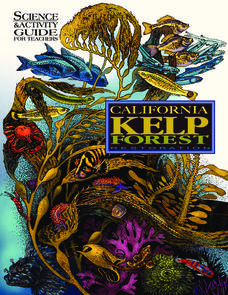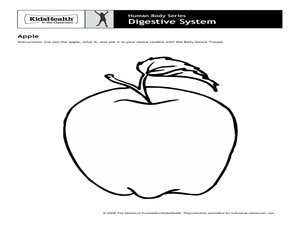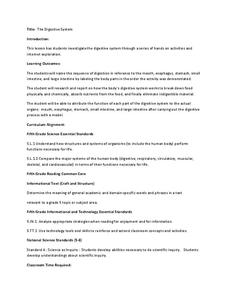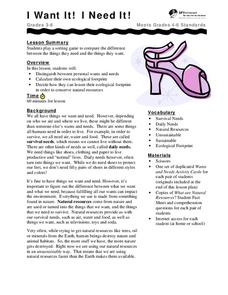Dawn N . Ericson
California Kelp Forest Restoration
This unit is so cool, you won't be able to "kelp" yourself! Intended for all grades, this science and activity guide for teachers offers a unique opportunity to understand kelp's role as a valuable ecological resource. Teachers and...
August House
Go to Sleep, Gecko
Use this multidisciplinary lesson to delve into these subjects: English language arts, math, science, drama, and character education. After reading, discussing, and making interpretations about Go To Sleep, Gecko!: A Balinese Folktale by...
Aquarium of the Pacific
Amazing Adaptations
We can all adapt. Classmates watch a video about the adaptations of sea horses that allow them to eat and move. They then watch penguins on webcams to see what adaptations help the penguins find food, move, and avoid predators. Finally,...
Curated OER
Human Body Series - Digestive System
With articles entitled, "What's Puke?" and "What is a Fart?" this digestive system lesson is sure to be a gas! Elementary anatomists do a belly dance to illustrate how food moves through the digestive system and then design a board game...
Growing Classroom
Space Travelers
Groups of three scientists from the rocky planet Zog investigate the composition of soil so that they can take the information back to their home, create soil there, and begin to grow food.
Science Matters
Crawly Composters
Get your hands dirty with an interactive instructional activity that showcases the process of decomposing and returning nutrients back into the soil. After building a compost pile, pupils regularly observe the...
National Park Service
Living & Non-Living Interactions
What better way to learn about ecosystems than by getting outside and observing them first hand? Accompanying a field trip to a local park or outdoor space, this series of collaborative activities engages children in learning about the...
British Council
Plastic-Free Is Not Easy
Paper or plastic? Scholars discuss a worksheet containing grocery photos in which consumers were challenged to buy items without plastic wrapping or containers. Learners rank the food items by the need for packaging, such as a banana,...
Curated OER
The Digestive System
Discover how the human body's digestive system works with a brain and stomach friendly activity. Scholars taste test a variety of foods to find out how they behave once in the mouth. Class members then play a game called Move That...
American Chemical Society
Molecules in Motion
I heard that oxygen and magnesium were going out and I was like "O Mg." Pupils experiment with adding food coloring to water of various temperatures in order to determine how temperature impacts molecular movement. This is the...
Rainforest Alliance
The Long Road to Coffee
During the fourth lesson plan of a series on Colombia, pupils discover the process to which the coffee plant becomes the coffee we drink. Pupils compare how locally grown foods get into homes to how coffee from Colombia gets into their mug.
NOAA
Ocean Layers II
Now that you know the ocean has layers, let's name them. The seventh installment of a 23-part NOAA Enrichment in Marine sciences and Oceanography (NEMO) program covers terminology associated with ocean layers, such as thermocline and...
Oklahoma State University
Hairy Heredity
Young scholars learn that heredity comes down to the flip of a coin with this cross-curricular math and science lesson. Using smiley faces as a model, students toss coins to determine which dominant or recessive traits will be passed on...
NOAA
Where There's Smoke, There's ...
A remotely operated vehicle approaching a volcano was engulfed by molten sulfur where the plumes of fluids contained the highest concentrations of aluminum ever recorded. This isn't science fiction or an April fools joke, though it did...
Berkshire Museum
The Three Life-Giving Sisters: Plant Cultivation and Mohican Innovation
Children gain first-hand experience with Native American agriculture while investigating the life cycle of plants with this engaging experiment. Focusing on what the natives called the Three Sisters - corn, beans, and squash - young...
Berkshire Museum
Backyard Rocks
You don't have to travel far to learn about rocks, just step outside, pick up a stone, and begin investigating. After taking a class walk around the school grounds collecting rocks, young scientists practice their skills of observation...
Teach Engineering
The Great Pacific Garbage Patch
The Great Pacific Garbage Patch is one of several garbage patches around the world where garbage accumulates naturally. As part of a GIS unit that combines oceanography, environmental science, and life science, class members investigate...
Alabama Wildlife Federation
Big Fish, Little Fish
Tag, you're eaten! A lesson on predator-prey relationships uses the game freeze tag as a model. Learners become either a predator or prey and play a game of tag as the prey tries to reach areas that house food and shelter. During the...
Children’s Hospital of Philadelphia
Learning From Animals
Is all research on animals bad? Learners use a video to understand how animal research benefits humans. Pupils read about a drug modification turned deadly and the result of the 1938 Federal Food, Drug, and Cosmetic Act. Scholars use a...
Howard Hughes Medical Institute
The Making of the Fittest: Got Lactase? The Co-evolution of Genes and Culture
Got milk? Only two cultures have had it long enough to develop the tolerance of lactose as an adult. Learn how the responsible genes evolved along with the cultures that have been consuming milk. This rich film is supplied with a few...
City and County of San Francisco
I Want It! I Need It!
Discuss wants and needs with your elementary ecologists and get them to consider what would happen to our natural resources if we all got everything that we want. Learners play a card sorting game and take an ecological footprint quiz on...
Howard Hughes Medical Institute
The Making of the Fittest: The Birth and Death of Genes
Adaptations must be made as environments change. This fabulous presentation features Icelandic icefish, a transparent, scaleless specimen that even has colorless blood. Genetics and adaptations concepts are explored as scientists study...
Howard Hughes Medical Institute
Got Lactase? The Co-Evolution of Genes and Culture
Does the human body evolve as quickly as human culture? With a stellar 15-minute video, explore the trait of lactose intolerance. Only about 1/3 of human adults seem to still have the enzyme lactase and therefore, the ability to digest...
Science Matters
Matter Cycles — Sum It Up
Scholars become part of the cycle of matter with a reader's theater that showcases producers, consumers, decomposers, and the sun. A diagram and discussion concludes the learning experience and enhances comprehension.
Other popular searches
- Science Project Food
- Science Animal Food Chain
- Food Science Experiments
- Food Science Vocabulary
- Food Science Careers
- Consumer Science Food
- Spanish Food Science
- Simple Food Science
- Food Science Service Project
- Food Science Nutrition
- Nutrition and Food Science
- Food Science Lesson Plan

























